The follies of modern politics.
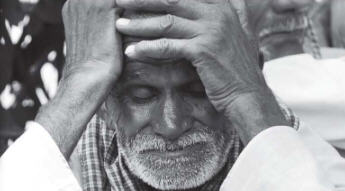
Misguided leaders: In the modern setup of the democratic states, the people themselves are fallen to the qualities of the sudras or less, and the government is run by their representative, who is ignorant of the scriptural mode of administrative education. Thus the whole atmosphere is surcharged with sudra qualities, manifested by lust and avarice. Such administrators quarrel every day among themselves. The cabinet of ministers changes often due to party and group selfishness. Everyone wants to exploit the state resources till he dies. No one retires from political life unless forced to do so. How can such low-grade men do good to the people? The result is corruption, intrigue and hypocrisy. (Srimad-Bhagavatam (1.12.18), purport)
Purposely diverting people from spiritual culture: The leaders of the modern society want that people should be engaged in working like dogs, hogs and asses. They should not understand what the value of life is, what the objective of life is. Let them always remain intoxicated, indulge in sense gratification, and produce more products for sense enjoyment. This is modern civilization. In this country the farmers are taxed so heavily that they are forced to work in the factory. This is a policy of the government leaders to engage people. If anyone wants to live peacefully, save time for developing Krsna consciousness, then the leaders of the society or the government will not allow him to do so. This is the position. (Lecture on Srimad-Bhagavatam (5.5.1-8), 8 September 1971, Stockholm)
Plundering leaders: The so-called democrats capture the administrative machine without assuming responsibility for the prosperous condition of the citizens. Everyone captures the post for personal gratification, and thus instead of one king, a number of irresponsible kings grow up to tax the citizens. It is foretold herein that in the absence of good monarchical government, everyone will be the cause of disturbance for others by plundering riches, animals, women, etc. (Srimad-Bhagavatam (1.18.45), purport)
NATURE OF INDIAN GOVERNMENT LEADERS
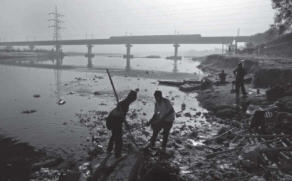
Afraid of religious expansion: The government was indirectly giving us so many hindrances in India. They do not like us. One cabinet member frankly said, “We do not want that your movement will increase very fast in India.” Because they know it that India is naturally inclined to Krsna. And if the selected people of the world combined together and push this movement in India, then the whole program of the modern leaders will collapse. That’s a fact. (Room Conversation with Canadian Ambassador to Iran, 13 March 1975, Iran)
Neglecting holy places: The Indian government thinks that Indian people, being too much religiously inclined, have fallen down economically; therefore these religious sentiments should be stopped completely. Here in Våndavana so many pilgrims come from all parts of the world. But it is kept in such unclean state to discourage people from coming here. The idea is that educated people, modernized people should not come here. They are introducing in the Våndavana area so many industrial things so that the spiritual atmosphere is killed. The temples are neglected(no question of improvement. The whole idea conveyed is: “Please do not come.” They cannot say this directly, but this is what they mean. (Lecture on Srimad-Bhagavatam (1.2.24), 4 November 1972, Våndavana)
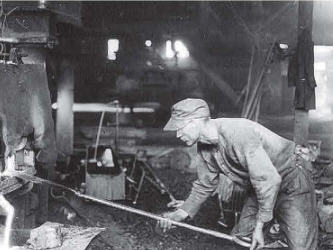
Subsidized industrial progress: The Indian government is giving subsidy to people to start small-scale industries. But the government or the leaders do not know that to engage people in such industrial affairs means to bring them to the sudra platform. Every government is encouraging people how to become sudra. But actually, the human society must be divided into four parts: brahmana, kñatriya, vaisya and sudra. Just like in our body there is division: the head, the arms, the belly and the leg. You cannot say, “Let there be only leg department. There is no use of head, arms and belly.” Will that go on nicely? If you cut off all other parts and simply keep the legs, will that be very nice proposal? Leg is required but head is essential. There is no program where people are trained to act as social heads, or brahmanas. (Lecture on Bhagavad-gita (2.31), 1 September 1973, London)
Failed in their duty: Because Indians or Indian government has failed to do this duty [of distributing spiritual knowledge], India is known as beggar country all over the world. When I travel, people ask, “Oh, you are from India? It is very poverty-stricken country.” (Lecture on Srimad-Bhagavatam (1.2.6),23 July 1973, London)
IDEAL GOVERNMENT
(Srimad-Bhagavatam (1.9.27), purport)
Trained leaders: Raja-dharma is a great science, unlike modern diplomacy for political supremacy. The kings were trained systematically to become munificent and not merely be tax collectors. They were trained to perform different sacrifices only for the prosperity of the subjects. To lead the prajas to the attainment of salvation was a great duty of the king. The father, the spiritual master and the king are not to become irresponsible in the matter of leading their subjects to the path of ultimate liberation from birth, death, diseases, and old age. When these primary duties are properly discharged, there is no need of government of the people, by the people.
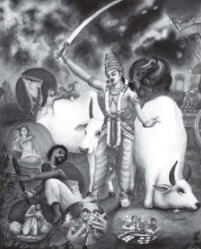
Qualified advisors to a chivalrous king: Actually the qualified brahmanas are meant to give direction to the kings for proper administration in terms of the scriptures like the Manu-saàhita and Dharma-sastras of Parasara. A typical king is the ideal of the people in general, and if the king is pious, religious, chivalrous and munificent, the citizens generally follow him. Such a king is not a lazy sensuous person living at the cost of the subjects, but alert always to kill thieves and dacoits. The pious kings were not merciful to dacoits and thieves in the name of nonsensical ahiàsa (nonviolence). The thieves and dacoits were punished in an exemplary way so that in the future no one would dare commit such nuisances in an organized form. Such thieves and dacoits were never meant for administration as they are now.
Law of taxation: The taxation law was simple. There was no force, no encroachment. The king had a right to take one fourth of the production made by the subject. The king had a right to claim a fourth of one’s allotted wealth. One would never grudge parting with it because due to the pious king and religious harmony there was enough natural wealth, namely grains, fruits, flowers, silk, cotton, milk, jewels, minerals, etc., and therefore no one was materially unhappy. The citizens were rich in agriculture and animal husbandry, and therefore they had enough grains, fruits and milk without any artificial needs of soaps and toilets, cinemas and bars.
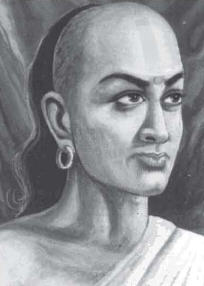
Proper utilization of human energy: The king had to see that the reserved energy of humanity was properly utilized. Human energy is meant not exactly for fulfilling animal propensities, but for self-realization. The whole government was specifically designed to fulfill this particular purpose. As such, the king had to select properly the cabinet ministers, but not on the strength of voting background. The ministers, the military commanders and even the ordinary soldiers were all selected by personal qualification, and the king had to supervise them properly before they were appointed to their respective posts. The king was especially vigilant to see that the tapasvis, or persons who sacrificed everything for disseminating spiritual knowledge, were never disregarded. The king knew well that the Supreme Personality of Godhead never tolerates any insult to His unalloyed devotees. Such tapasvis were trusted leaders even of the rogues and thieves, who would never disobey the orders of tapasvis. The king would give special protection to illiterates, the helpless, and widows of the state. Defense measures were arranged previous to any attack by the enemies. The taxing process was easy, and it was not meant for squandering, but was for strengthening the reserve fund. The soldiers were recruited from all parts of the world, and they were trained for special duties.
